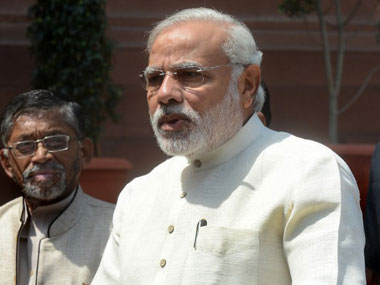Prime Minister Narendra Modi has reportedly instructed his government to re-look at Section 66A of the Information Technology (Amendment) Act, 2008 which has been at the centre of the freedom of speech debate in India. According to a report on The Indian Express , following ‘direct intervention’ from the Prime Minister, the Ministry of Communication and Information Technology has decided to frame guidelines that will prevent the law from being misused.
“The submissions, as per the sources, were in line with Modi’s beliefs on the use of social media, which he has always acknowledged as a very powerful medium of social change,” notes The Indian Express.
The Modi government’s representative argued before a bench of Justices J Chelameswar and S A Bobde that the government needs to frame guidelines which doesn’t lead to abuse of the law. The IE reports:
“Even the most vociferous of the political dissent would not be attempted to be curbed by way of this legislation. We are willing to take all preemptive steps to negate the chilling effect that Section 66A may have on an individual’s right to speech and expression,” said Additional Solicitor General Tushar Mehta.
The suggestion that guidelines should be formulated for the use of 66A came when the government was was presenting its argument in a case lodged by Shreya Singhal and non-profit organisation Common Cause. The latter challenged the constitutionality of the Section 66A in the Supreme Court. The bench hearing the case agreed that the section was being used for ‘unpalatable political activities’. Mint reports:
The court further observed that if the law was being abused, on a case to case basis, the same could be looked into instead of striking down the entire provision. “(we) want to see the infirmity in the law,” the court said.
The government was addressing the court’s concerns.
The IT Act was framed in 2000 and was then amended in 2008 by the UPA government. Section 66A of the act says the following:
Any person who sends, by means of a computer resource or a communication device,—
(a) any information that is grossly offensive or has menacing character; or
(b) any information which he knows to be false, but for the purpose of causing annoyance, inconvenience, danger, obstruction, insult, injury, criminal intimidation, enmity, hatred or ill will, persistently by making use of such computer resource or a communication device,
(c) any electronic mail or electronic mail message for the purpose of causing annoyance or inconvenience or to deceive or to mislead the addressee or recipient about the origin of such messages,
shall be punishable with imprisonment for a term which may extend to three years and with fine.
The law has been used to make arbitrary arrests based on complaints lodged by people sometimes out of sheer vindictiveness. Apprehensions about the misuse of the Section 66A deepened after PM Modi was voted into power and some people were arrested because they had criticised the leader on social media platforms. Given the kind of hero worship Prime Minister Modi inspired, it was being feared that his fans would lodge a flurry of complaints whenever they felt their leader had been slighted and arrests would follow. The section also triggered a debate about public space and personal space as it applies to content on personal social media accounts held by individuals.
In August this year, a Kerala youth named Rajeesh was arrested by the police after an RSS worker lodged a complaint based on the former’s Facebook posts on PM Modi. Rajeesh, a CPM worker was promptly arrested after the RSS worker alleged that his posts on PM Modi were ‘abusive’.
A shipping professional Devu Chodankar from Goa faced an arrest warrant in May this year, roughly a week after Modi was elected as the PM, again for criticising Modi on his personal Facebook page. CM Then CM Manohar Parrikar had actually gone on to wash his hands off the arrest by saying, “A prominent citizen complained about a Facebook post, which was registered as per Supreme Court guidelines by the police. The anticipatory bail was rejected by the court as per evidence and the government has no role.” Soon after, an MBA student was arrested from Bangalore on the grounds of posting objectionable messages against Modi.
In fact, it’s not just the over enthusiastic BJP fans who were behind the ‘misuse’ of the section of the IT Act. In 2012, the Mamata Banerjee government found itself in the eye of a storm when a professor of Jadavpur University was arrested for forwarding an email which had cartoons on the Bengal CM. One of the various laws he was charged with was the Section 66A of the IT Act.
There had been protests against the 66A in the past too and it has been challenged in court too . However, the Modi government’s move to regulate the implementation of the law is welcome and might help in smoothen the government’s line of communication with its voters.


)




)
)
)
)
)
)
)
)